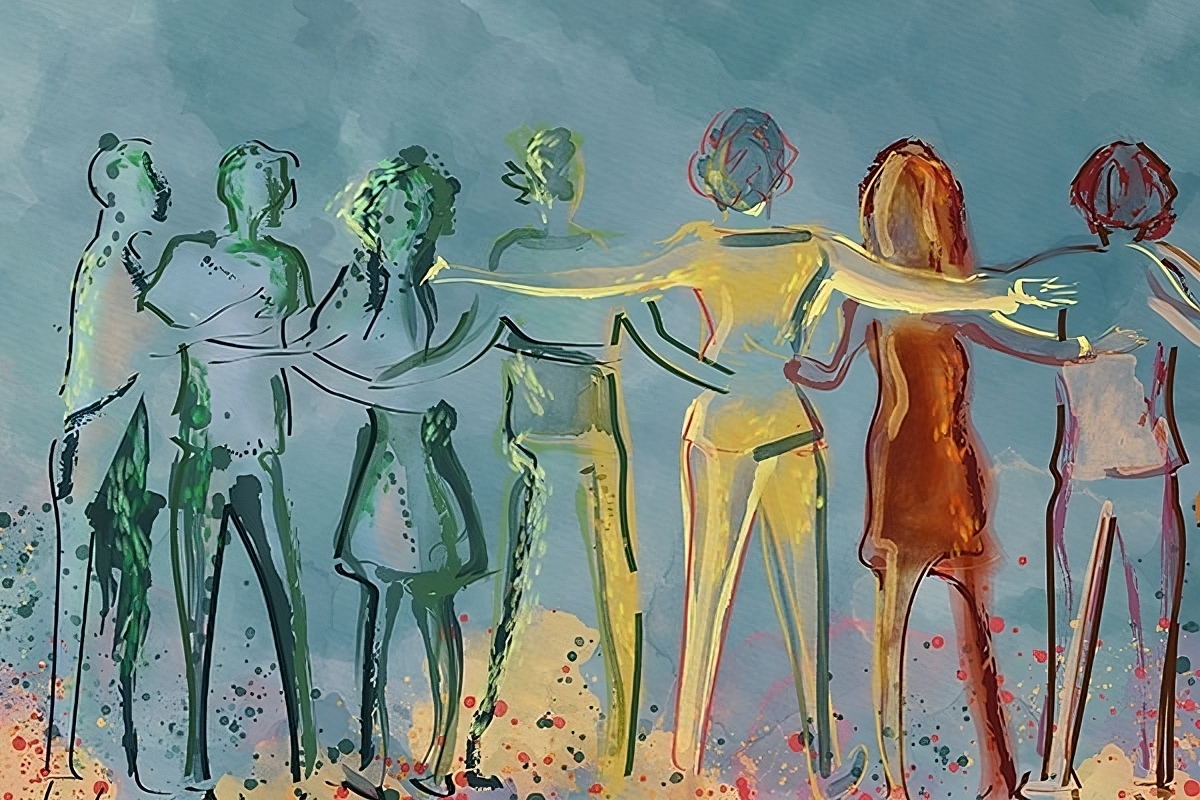The Power of Shared Power: Co-Directing Nonprofits Through Compassion
Learn how Compassionate Atlanta developed trust with one another through shared power in their nonprofit model.

Sharing power in leadership can help nonprofits move forward together.
We have found that qualitatively, compassion is often perceived as weak, soft, and forgiveness-focused. But compassion is as much about discussion, truth telling, and the hard work of moving forward together. We discovered that many people have a cultural interpretation of what compassionate action looks and feels like.
Compassionate action is not universally accepted as a single notion. In the Black Mecca of Atlanta, Compassionate Atlanta resonated with white progressive groups as well as international and interfaith communities. We had strong relationships with many individual African Americans, but we lacked a presence and an understanding of our work in the Black community.
Compassion can be misunderstood in the Black community where it is often associated with exoneration and niceties that do not honor the gory history of racial relations in America.
Compassionate Atlanta is a six-year-old grassroots nonprofit that responds to the asks of our communities to advance the culture of compassion in the greater metropolitan area. We engage with local partner organizations who have signed the Global Charter for Compassion, the result of scholar Karen Armstrong’s research finding that all world religions have the principle of compassion at their core.
Armstrong’s vision was to bring together community leaders of all faiths and sectors of business to write a charter that people could understand and to which they could easily commit.
The Global Charter asks us to “work tirelessly to alleviate the suffering of our fellow creatures, to dethrone ourselves from the centre of our world and put another there, and to honour the inviolable sanctity of every single human being, treating everybody, without exception, with absolute justice, equity, and respect.”
Though Compassionate Atlanta appeared to meet the criteria for Justice, Diversity, Equity, and Inclusion, Executive Director, Leanne Rubenstein noticed that there was a missing piece: an innovative way to focus on creating a culture of belonging in the organization beyond the JDEI checklist.
She knew that the missing piece could be explored through a shared leadership model.
Shared Power in Leadership
Compassionate Atlanta hired Leanne as its first executive director in 2016 on a part-time basis. She was supported with a part-time communications coordinator. The longer-term goal was to increase the executive director position to full time. In the nonprofit world, this often translates into a hierarchical power model where the power lies with one person who becomes overworked and lonely.
Instead of going to a full-time position, Leanne proposed hiring a co-director and sharing the full-time salary. Leanne believed that the co-directorship model reflected the greater values of the organization. In the spirit of dethroning the status quo and exploring innovative ways to address the goals of the organization, Leanne searched for a peer.
As a white, gay, Jewish, immigrant, cis-gender woman, and a strong extrovert, she also knew she needed someone to bounce ideas around with. Given the population of Atlanta, Leanne specifically wanted to work side by side with a person of color.
Leanne understood that a shared power model would stretch herself as well as the organization. With a growth mindset, and a commitment to being a compassionate leader, she embarked on this co-directorship venture as an experiment with the blessing of the board.
Compassion is a communal value that requires people to treat each other with grace and mutuality. If no one is your “peer” in your community, how can that mutuality be expressed? To expand the culture of a small but diverse organization where everyone experiences belonging, the organizational practice must be to consistently evaluate and explore shared power.
This ensures a proper ongoing allocation as well as redistribution of power. Leanne believed that a co-directorship leadership model—one that shared power and not just responsibilities—was a way to model compassion in leadership. She sought to implement this innovative approach for the organization.
Combined Intentionality and Transparency
Iyabo Onipede, a Black, straight, Christian immigrant cis-gender woman, started out with a few hours a week to give the two directors an opportunity to get to know each other in a work context. They wrote up job descriptions and maintained open dialogue around growth, change, and development. As a co-director, Iyabo became a full partner with shared responsibilities and power over the course. Leanne and Iyabo have different strengths.
Instead of competing against each other, they own their strengths and take responsibility for their own bandwidth to execute projects. They support each other during personal emergencies and absences when they tend to work more independently. The combined intentionality and transparency in their relationship and work styles set a different tone with the board for the organization to develop a self-examining inclusive culture.
This was not just compassionate, but it was also an opportunity to model how to lead to the over 160 partners associated with the organization.
For Compassionate Atlanta, the notion of shared power has evolved. Compassionate Atlanta grew out of a culture of acceptance and a desire for all people to be at the table. In the nonprofit world, executive directors can easily experience burnout due to the high demands of the job and the siloed nature of the position.
In trying to manage multiple stakeholders, such as the board versus the partners versus the contract staff, an executive director must make a plethora of decisions in a speedy manner. No one is the true peer to a single executive director.
Not having a partner to walk alongside with creates immense stress, lack of time for self-care, and the trap of falling into the expectation of working all the time, as the single executive director holds all the responsibility.
With the addition of a co-director, the magic of shared power has strengthened our mission, our community credibility, our reach, and our own self-care. To help get this started at your own organization, read our guide.
Shared power has been a positive experience for Compassionate Atlanta. It has not always been easy. There have been unexpected aspects of personal power that we have had to explore and share with each other, but the trust that we have developed with one another has guided our co-leadership relationship.
Furthermore, it has deepened our work experience. Shared power has helped us grow as individuals; helped us resolve organizational problems; and empowered us to address racial, social, and economic justice issues in our communities.
It is our intention to continue with shared power leadership and be accountable champions for it, as we believe it models organizational compassion.
In case you missed it…
Practical Guide to How Nonprofits Can Create Equity in Organizations and Community
You might also like:
- I Wanted to Be the Cool Boss — and Almost Destroyed My Organization
- How to Stop Managing Your Nonprofit and Start Leading
- When the Board Becomes the Problem: Reclaiming Power in Nonprofit Leadership
- Why Human-Centered AI Adoption Matters for Nonprofits
- The New Sheriff in Town: Tips for Successfully Leading a Nonprofit Team (that Someone Else Built)
You made it to the end! Please share this article!
Let’s help other nonprofit leaders succeed! Consider sharing this article with your friends and colleagues via email or social media.
About the Author
Iyabo Onipede and Leanne Rubenstein are Co-Directors at Compassionate Atlanta where they inspire each other as they advance the culture of compassion throughout the Greater Atlanta area by responding to the asks of communities. Together they bring a wealth of experience and knowledge to curate deep dives into the heart of inclusion, equity, and racial justice.
They are community builders focused on creating spaces of belonging by opening pathways forward for organizations to build just and equitable environments. As passionate storytellers, they have transformed program development and leadership skills into amplifying shared voices in the wider community. They encourage philanthropy with discernment to make a positive impact in local and global communities worldwide.
A self-described “recovering attorney,” Iyabo is now a public theologian after a 20-year legal career. Contact Iyabo at Iyabo@CompassionateATL.org.
Leanne brings over 20 years of non-profit experience with an extensive background working in a leadership capacity with non-profit organizations. Contact Leanne at Leanne@CompassionateATL.org.
Articles on Blue Avocado do not provide legal representation or legal advice and should not be used as a substitute for advice or legal counsel. Blue Avocado provides space for the nonprofit sector to express new ideas. The opinions and views expressed in this article are solely those of the authors. They do not purport to reflect or imply the opinions or views of Blue Avocado, its publisher, or affiliated organizations. Blue Avocado, its publisher, and affiliated organizations are not liable for website visitors’ use of the content on Blue Avocado nor for visitors’ decisions about using the Blue Avocado website.








Hello, I’m Joey Mitchell cofounder of the Bridge with Greg Sudmeier. I hope we can talk together in person someday soon.
Peace
Joey
That’s so great to read, a quite sensible and educational post you’ve written, such amazing writing skills, it’s quite appreciable, loved to read it! as a writer, I’m also intending to make an informative portfolio for students of colleges and universities related to personal statement writing service so that they can easily get to know what it’s origin is.